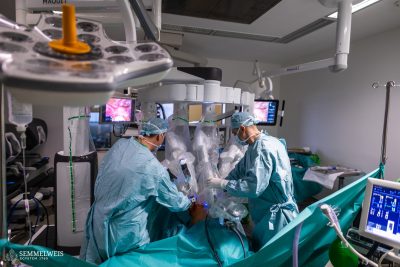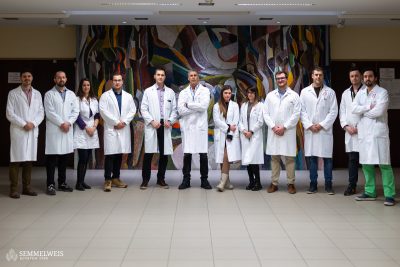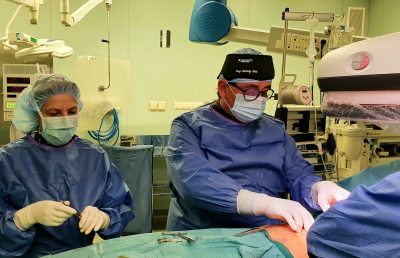In celebration of the Institute of Medical Microbiology turning 70 years old, a ceremony was held in the Great Hall of the Nagyvárad Tér Theoretical Building. After the historical review by Dr. Dóra Szabó, Director of the Institute, Dr. István Nász, founding member and former Director of the Institute, recalled memories of the past 70 years. As a part of the scientific program, in addition to virological research, current research projects were also discussed.
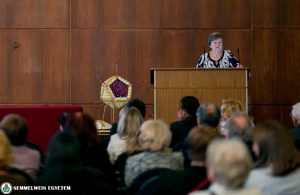 In her presentation, Dr. Dóra Szabó presented the main points in the history of the institute. She recalled that Endre Hőgyes, the director of the Institute of General Pathology and Bacteriology at that time, had introduced the teaching of bacteriology in 1883, alongside the introduction of the anti-rabies vaccination in Hungary. He was followed by Hugó Preisz, who was primarily concerned with bacteriological illnesses that also had a veterinary significance. She pointed out that the independent Institute of Microbiology was founded in 1948 under the leadership of Ferenc Faragó, who served as director for two years.
In her presentation, Dr. Dóra Szabó presented the main points in the history of the institute. She recalled that Endre Hőgyes, the director of the Institute of General Pathology and Bacteriology at that time, had introduced the teaching of bacteriology in 1883, alongside the introduction of the anti-rabies vaccination in Hungary. He was followed by Hugó Preisz, who was primarily concerned with bacteriological illnesses that also had a veterinary significance. She pointed out that the independent Institute of Microbiology was founded in 1948 under the leadership of Ferenc Faragó, who served as director for two years.
Modern virological research started in 1965, the adenovirus research group was founded by Dr. István Nász, and later Dr. István Nász, Dr. Ilona Béládi and Dr. Anna Lengyel published the prize-winning book on adenoviruses and their pathogenic implications, the first to provide extensive knowledge of the adenovirus family. In 2013, Dr. István Nász and Dr. Éva Ádám summarized the 50 years of adenovirus research. Dr. Dóra Szabó also mentioned that in 1978 they moved from Hőgyes Endre Street to Nagyvárad Tér Theoretical Building, and became the Institute of Medical Microbiology in 2001. The Director emphasized that they were involved in teaching students of the faculties of medicine, dentistry, and pharmacy in Hungarian, English and German; besides graduate education, the institute is also involved in postgraduate education and in PhD training – she added.
The director summarized the life and accomplishments of Dr. István Nász, emphasizing that he was a founding member of the institute and leader of the adenovirus research team for 50 years. She recalled that he was a longtime member of the Hungarian Academy of Sciences (MTA), a microbiologist and virologist, and proud recipient of the Szechenyi Award and the cross of the Hungarian Order of Merit. Dr. Nász, who had served as the vice-rector and institute director, celebrated his 90th birthday last year.
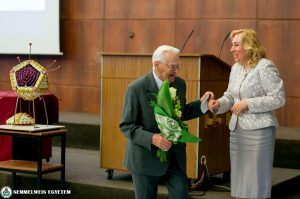 The jubilee ceremony was attended by Dr. István Nász, who remembered how he came to the institute – which has since become his second home – as a fourth year medical student 70 years ago, on September 15, 1948. He was pleased to be able to attend and participate in the Institute’s work and to see its success. He said that while it has been hard to be physically present in recent years, he is always present “in spirit and in soul”, as he feels good here. He mentioned the teaching and research work accomplished under Dr. Ferenc Faragó’s leadership, which has remained unbroken since then.
The jubilee ceremony was attended by Dr. István Nász, who remembered how he came to the institute – which has since become his second home – as a fourth year medical student 70 years ago, on September 15, 1948. He was pleased to be able to attend and participate in the Institute’s work and to see its success. He said that while it has been hard to be physically present in recent years, he is always present “in spirit and in soul”, as he feels good here. He mentioned the teaching and research work accomplished under Dr. Ferenc Faragó’s leadership, which has remained unbroken since then.
Afterwards, Dr. Dóra Szabó remembered their former director, Dr. Piroska Anderlik, who had recently passed away and who, according to her words, helped her colleagues and students with her friendly, kind personality and practical advice. In honor of her expert work in animal testing, the animal testing lab on the 21st floor of the institute is renamed Piroska Anderlik animal testing scientific laboratory,” announced the director.
For the rest of the program, the former medical directors and co-workers of the Institute of Medical Microbiology presented research projects taking place under their leadership. Dr. Éva Ádám first gave a lecture entitled “47 years in Adenovirus Research”, followed by Dr. József Ongrádi’s “Adenoviruses: Past, Present, Future”, Dr. Károly Nagy spoke about HIV research, and Dr. Ferenc Rozgonyi introduced the Central Clinical Microbiological Diagnostic Laboratory. In the second part of this section, research on bacteriology and microbiology in the Institute was discussed. In cooperation with various clinics, the Institute conducts research primarily about the carrying, spreading and treatment options of multi-resistant bacteria – the director pointed out.

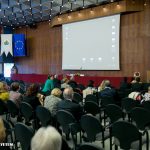
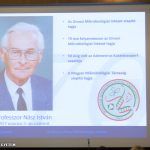


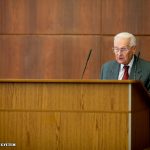
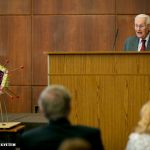


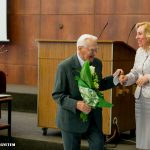

Bernadett Bódi
Photo: Semmelweis University – Attila Kovács
Translation: Faye Gillespie
